
The North Atlantic Treaty Organization, also called the North Atlantic Alliance, is an intergovernmental military alliance between 30 European and North American countries. The organization implements the North Atlantic Treaty that was signed on 4 April 1949. NATO constitutes a system of collective defence whereby its independent member states agree to mutual defence in response to an attack by any external party. NATO's Headquarters are located in Haren, Brussels, Belgium, while the headquarters of Allied Command Operations is near Mons, Belgium.
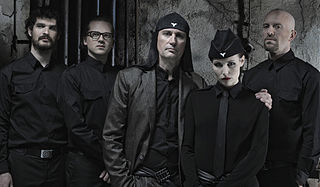
Laibach is a Slovenian avant-garde music group associated with the industrial, martial and neo-classical genres. Formed in the mining town of Trbovlje in 1980, Laibach represents the musical wing of the Neue Slowenische Kunst (NSK) collective, a group which Laibach helped found in 1984. "Laibach" is the German historical name for the Slovenian capital Ljubljana, itself an oblique reference to the Nazi occupation of Slovenia in World War II.

Republika Srpska is one of the two entities of Bosnia and Herzegovina, the other being the Federation of Bosnia and Herzegovina. The official entity's name in English is the Republic of Srpska. Its largest city, de facto capital and administrative centre is Banja Luka, lying on the Vrbas river.

Nova akropola is the second studio album by Laibach. It was released in 1986.

Kapital (Capital) is the fourth studio album by Laibach. It includes tracks such as "Wirtschaft ist tot". Unusually, the LP, CD and cassette releases each contain different versions of every song. Track "Steel Trust" by Laibach sub-group Germania, appears only on LP and cassette. Album was produced by Holger Hiller, Julian Briottet, Laibach, Paul Kendall, Russell Haswell and Daniel Miller.
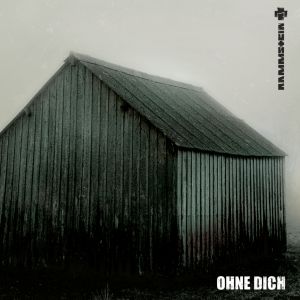
"Ohne dich" is a song by German Neue Deutsche Härte band Rammstein. It was released on 22 November 2004 as the third single from their fourth studio album, Reise, Reise (2004).

Goražde is a city and the administrative center of Bosnian-Podrinje Canton Goražde of the Federation of Bosnia and Herzegovina, an entity of Bosnia and Herzegovina. It is situated on the banks of Drina river. As of 2013, it has a population of 20,897 inhabitants.
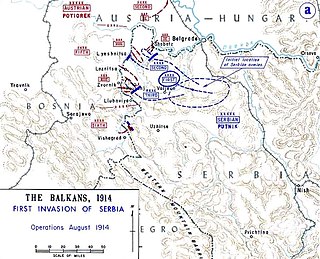
The Battle of Cer was a military campaign fought between Austria-Hungary and Serbia in August 1914, starting three weeks into the Serbian Campaign, the initial military action of the First World War. It took place around Cer Mountain and several surrounding villages, as well as the town of Šabac.

Bajina Bašta is a town and municipality located in the Zlatibor District of western Serbia. The town lies in the valley of the Drina river at the eastern edge of Tara National Park.

Višegrad is a town and municipality located in eastern Republika Srpska, an entity of Bosnia and Herzegovina. It is resting at the confluence of the Drina and the Rzav river. As of 2013, it has a population of 10,668 inhabitants, while the town of Višegrad has a population of 5,869 inhabitants.

Rekapitulacija 1980–1984 is a retrospective album by the Slovenian industrial group Laibach. It was first released as a double LP boxset in 1985, and re-released on CD in 1987.

Anthems is a compilation by the Slovenian industrial music group Laibach. It was released in 2004 as a double album. The first CD contains a collection of Laibach's best tracks throughout the years, while the second disc accommodates remixes of Laibach songs by different artists. Besides the CDs, the Anthems box also contains a 44-page booklet with a history of Laibach plus several paintings and photographs by and of the band.

Skelani is a village in the municipality of Srebrenica, in the Republika Srpska entity of Bosnia and Herzegovina.
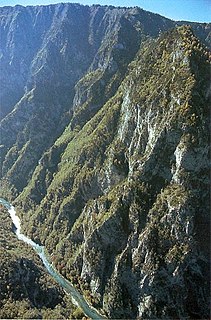
The Tara River Canyon also known as the Tara River Gorge, is a part of Durmitor National Park.

The March to the Drina is a Serbian patriotic march which was composed by Stanislav Binički during World War I. Binički dedicated it to his favourite commander in the Serbian Army, Col. Milivoje Stojanović, who had fought during the Battle of Cer, but was killed later in the Battle of Kolubara. The song experienced widespread popularity during and after the war and came to be seen by Serbs as a symbol of resistance to the Central Powers. Following World War II, it was popular in Socialist Yugoslavia where a single release in 1964 achieved Gold Record status. The march was played at the presentation ceremony for the Nobel Prize in Literature when Yugoslav writer Ivo Andrić was named a Nobel laureate in 1961.

The Drina is a 346 km (215 mi) long international river, which forms a large portion of the border between Bosnia and Herzegovina and Serbia. It is the longest tributary of the Sava River and the longest karst river in the Dinaric Alps which belongs to the Danube river watershed. Its name is derived from the Roman name of the river which in turn is derived from Greek.

The Battle of the Drina was fought between the Serbian and Austro-Hungarian armies in September 1914, during World War I. The Austro-Hungarians engaged in a significant offensive over the Drina river at the western Serbian border, resulting in numerous skirmishes. In early October, the Serbian Army was forced to retreat, and later regrouped to fight in the subsequent Battle of Kolubara.
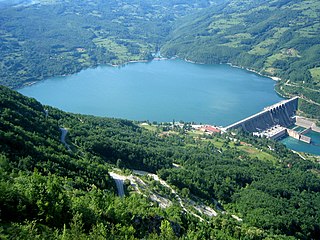
Lake Perućac is an artificial lake on the Drina River, on the border between Bosnia and Herzegovina and Serbia. It was created in 1966 and occupies a natural bend of the river, which encircles the Tara mountain, between towns of Višegrad in Bosnia and Bajina Bašta in Serbia.

The regional geology of Serbia describes the geologic structure and history inside the borders of Serbia.

March on the Drina is a 1964 Yugoslav war film co-written and directed by Žika Mitrović. The film was released by the Avala Film studio in Belgrade. The screenplay was written by Žika Mitrović and Arsen Diklić. The title is derived from the eponymous 1914 musical composition by Stanislav Binički.




















